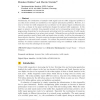Free Online Productivity Tools
i2Speak
i2Symbol
i2OCR
iTex2Img
iWeb2Print
iWeb2Shot
i2Type
iPdf2Split
iPdf2Merge
i2Bopomofo
i2Arabic
i2Style
i2Image
i2PDF
iLatex2Rtf
Sci2ools
119
Voted
ATMOS
2010
2010
Traffic Signal Optimization Using Cyclically Expanded Networks
Traditionally, the coordination of multiple traffic signals and the traffic assignment problem in an urban street network are considered as two separate optimization problems. However, it is easy to see that the traffic assignment has an influence on the optimal signal coordination and, vice versa, a change in the signal coordination changes the optimal traffic assignment. In this paper we present a cyclically time-expanded network and a corresponding mixed integer linear programming formulation for simultaneously optimizing both the coordination of traffic signals and the traffic assignment in an urban street network. Although the new cyclically time-expanded network provides a model of both traffic and signals close to reality, it still has the advantage of a linear objective function. Using this model we compute optimized signal coordinations and traffic assignment on real-world street networks. To evaluate the practical relevance of the computed solutions we conduct extensive simu...
Related Content
| Added | 10 Feb 2011 |
| Updated | 10 Feb 2011 |
| Type | Journal |
| Year | 2010 |
| Where | ATMOS |
| Authors | Ekkehard Köhler, Martin Strehler |
Comments (0)

